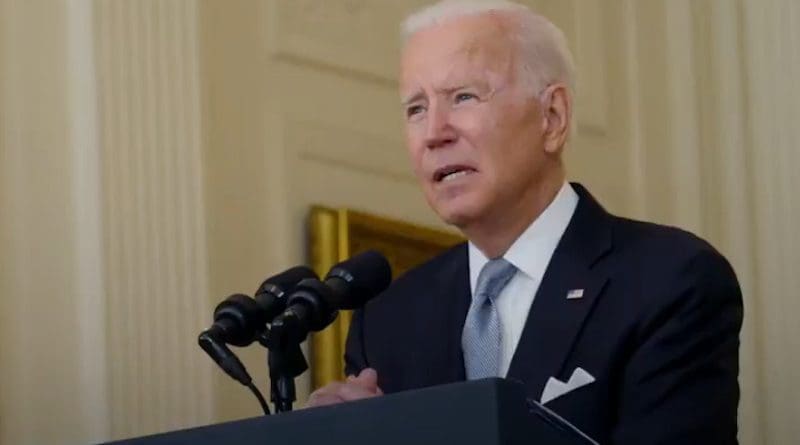Kabul Evacuation Numbers To Fluctuate, Biden Says
By VOA
By Ken Bredemeier
The number of people evacuated from Kabul will change from day to day, President Joe Biden said in a televised address Sunday, depending on specific conditions and safety of the day.
Earlier Sunday, the White House said the U.S. had evacuated 7,400 people from Kabul in the previous 24 hours and Biden said as many as 11,000 were evacuated in a 36-hour period over the weekend. Tens of thousands more await a ride out of Kabul.
In all, the U.S. has evacuated 25,100 people in the last week, a White House official said.
“Any American who wants to get home, will get home,” Biden said. “We’re also moving to work our Afghan allies … and other vulnerable Afghans out of the country.”
Biden said none of the planes from Kabul were flying straight to the United States. Instead, he said, all flights first land in military bases in a handful of countries where non-U.S. citizens will undergo background checks and security screenings.
Since July, the president said about 33,000 people have been evacuated from Kabul, even as American officials confront what Secretary of State Antony Blinken described as an “incredibly volatile situation at the airport” after the Taliban takeover of Afghanistan a week ago.
Meanwhile, Defense Secretary Lloyd Austin activated the use of 18 civilian passenger jets from six U.S. airlines to help ferry Americans and Afghans from safe havens where they were staying after leaving Kabul. It is the third time in the past 30 years the U.S. has invoked use of civilian aircraft to assist the military.
Blinken told the “Fox News Sunday” television show that the latest group of evacuees, Americans and Afghans who had assisted them in 20 years of U.S. fighting in Afghanistan, left on 60 flights, with many of them headed to Mideastern countries.
Earlier Sunday, Biden discussed the Afghan situation at the White House with Blinken, Austin and other key national security officials, affirming the role played by partner countries in relocating Afghans leaving their homeland.
Chaotic scenes at the Kabul airport of many foreign residents, including Americans, trying to flee Afghanistan, as well as Afghans trying to flee after the Taliban takeover of their country, have been broadcast around the world for days now.
But White House national security adviser Jake Sullivan told CNN’s “State of the Union” show that U.S. forces have “secured the capacity to get large numbers of Americans safe passage through the airport and onto the airfield.”
“At the moment, we believe we have sufficient forces on the ground” to control the crowds trying to leave the country, Sullivan said in a separate interview on NBC’s “Meet the Press.”
Sullivan said that “every single day” Biden “asks his military commanders, including those at the airport and those at the Pentagon, whether they need additional resources, additional troops. So far, the answer has been ‘no,’ but he will ask again today.”
He said that “if in the end, Americans are blocked from getting to the airport, blocked from leaving the country or our operations are disrupted or our evacuations are in some way interfered with, we have explained to (the Taliban) that there will be a swift and forceful response.”
Sullivan said the U.S. has “agreements with 26 nations around the world to logistically move Afghans and Americans and third-country nationals out of the country and to air bases throughout neighboring countries and further afield.”
While most of the evacuations have occurred at the Kabul airport, the U.S. also deployed three military helicopters to rescue 169 Americans from a hotel.
“We will do what is necessary to get Americans out of harm’s way,” Blinken said.
He deflected questions about U.S. miscalculations about the swift Taliban takeover of the Afghan government, saying there would be “plenty of time to determine what might have been done differently and what lessons could be learned.”
But he acknowledged, “We believed the government was not about to collapse and the (Afghan) military fade away.”
In July, Biden said it was “highly unlikely” that the Taliban would abruptly assume control, as it did in a matter of days a week ago.
A Biden critic, Republican Senator Ben Sasse of Nebraska, said the U.S. leader “needs to step up and be a commander in chief” to control the evacuation.
He said the U.S. needs to consider retaking the Bagram airfield outside Kabul that it abandoned as U.S. forces ended their operations there.
Sasse called leaving Bagram “one of the stupidest blunders,” leaving the Kabul airport as the only major departure point.
Defense Secretary Austin echoed Biden, saying the commercial airlines assisting the military would not fly into Kabul but rather be used “for the onward movement of passengers from temporary safe havens and interim staging bases.”
Most likely the U.S. commercial jets will carry Afghans from such Persian Gulf states as Qatar and the United Arab Emirates where many Afghans are awaiting next moves after escaping Kabul.
The activation of the aircraft includes four from United Airlines, three each from American Airlines, Atlas Air, Delta Air Lines and Omni Air and two from Hawaiian Airlines.
The Defense Department said it “does not anticipate a major impact to commercial flights from this activation.”
The Civil Reserve Air Fleet was created in 1952 to assist the U.S. military in emergencies such as what has quickly evolved in Kabul over the last week, where thousands of Americans and Afghans have tried desperately to leave the country.
Civilian aircraft were previously used during the first Gulf War in 1990 and 1991 and in Iraq in 2002 and 2003.
The Defense Department said the use of the civilian aircraft will allow the U.S. military “to focus on operations in and out of in Kabul.”
Some of the Afghan evacuees are expected to move to the United States and others elsewhere in the world.

